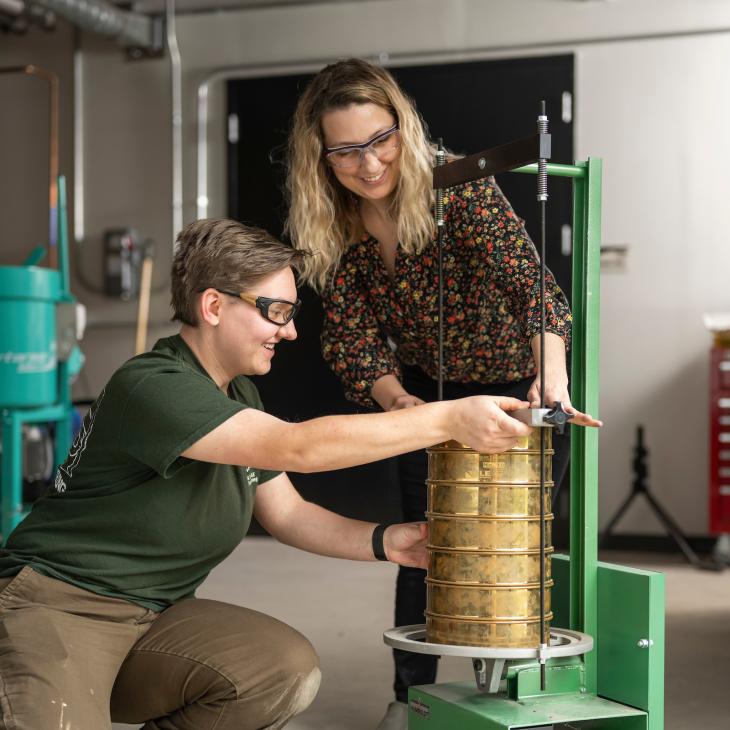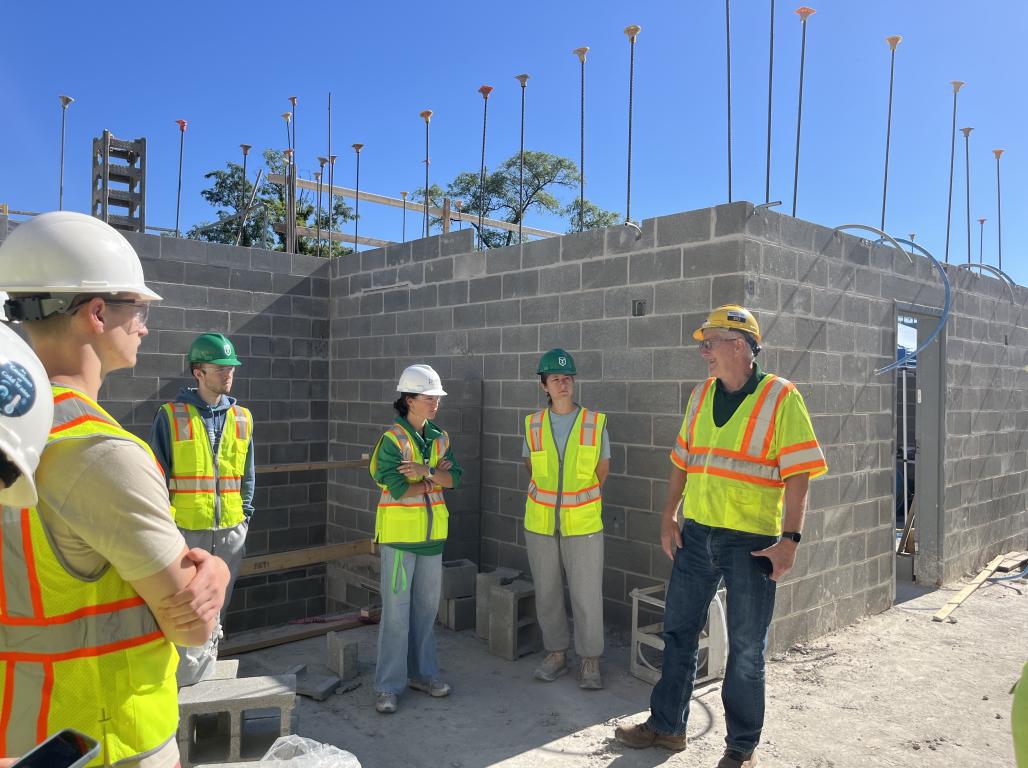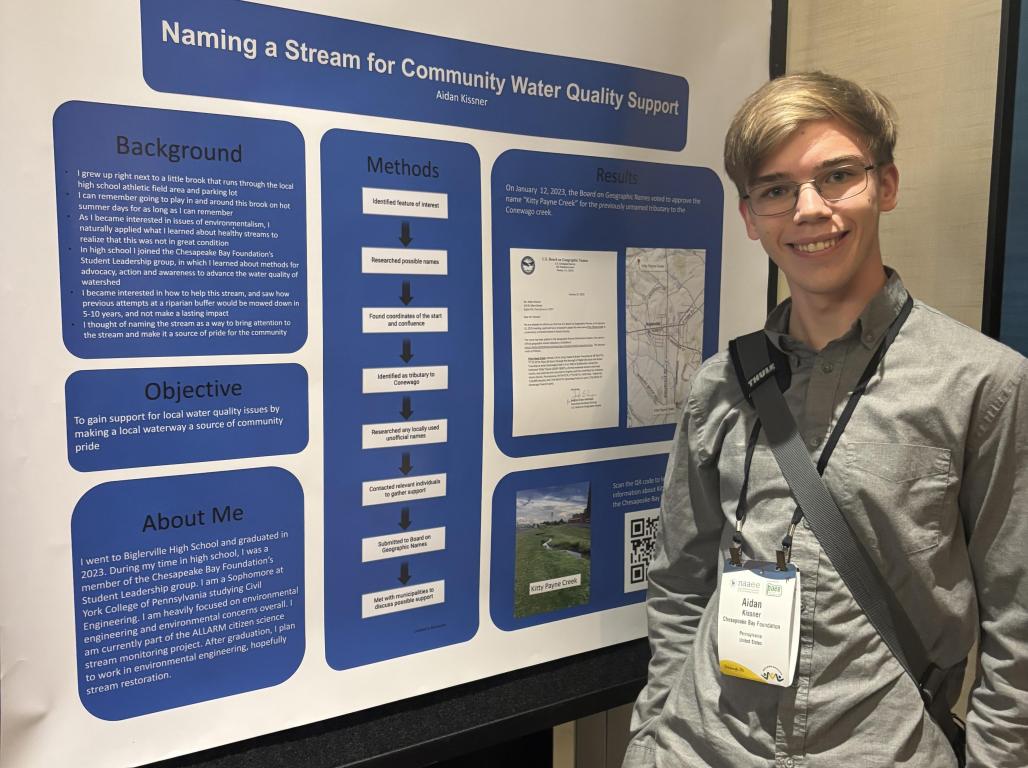Civil Engineering


Imagine tomorrow’s infrastructure solutions at York College.
The Bachelor of Science (B.S.) in Civil Engineering degree program at York College of Pennsylvania is the first step in a career with a meaningful daily impact on the everyday lives of people across the globe. Position yourself at the forefront of creating and maintaining the physical frameworks of our communities, such as roads, bridges, airports, tunnels, dams, and essential water and sanitation systems.
Our bachelor’s degree in Civil Engineering offers a broad-based education and a built-in two semester co-op work experience to prepare you for work in any aspect of civil or environmental engineering. Coursework emphasizes sustainable engineering and design practices, ensuring that graduates are ready to contribute to in-demand roles now and in the future.
York College Civil Engineering values putting theory to practice. Along with personalized instruction, participate in hands-on projects, interact with industry practitioners, and receive support from esteemed faculty passionate about your success.
About the Bachelor of Science in Civil Engineering
Civil Engineering Degree Requirements
The B.S. in Civil Engineering program at York College offers a curriculum rooted in hands-on experiences and real-world applications. Core courses are crafted to ensure students grasp the multifaceted dimensions of civil engineering subjects, from sustainable infrastructures to environmental considerations, using state-of-the-art tools and methodologies.
Civil Engineering major courses include:
- CVE 210: Sustainable Engineering
- CVE 280: Civil Engineering Site Design
- CVE 320: Transportation Engineering
- CVE 330: Introduction to Geotechnical Engineering
- CVE 340: Structural Analysis
- CVE 350: Introduction to Environmental Engineering
Students are required to complete three semesters of co-op, totaling six credits. The entire program spans 132 credits, encompassing general education, interdisciplinary insights, core major courses, and varied electives to provide a comprehensive understanding of the field.
Project-Based Courses
At York College, our program immerses students in real-world projects from the start. They begin by tackling group projects, and by senior year, they work on complex designs, directly catering to actual clients' specifications for buildings and open spaces.
Students are encouraged to step out of the classroom and into the field, engaging in real projects that mirror the challenges they will face in their professional careers.
Admissions and Aid
We welcome transfer and first-time applicants to explore undergraduate admissions to take the next step toward the innovative and impactful world of civil engineering.
With ongoing enrollment, you can apply today to begin being considered for scholarships, financial aid, and admission to your ideal program.
Learn more about financial aid, including tuition and scholarship details.
Earn a B.S. in Civil Engineering at York College of Pennsylvania
York College's B.S. in Civil Engineering degree bridges theory and real-world application. Dive into a program where innovative education meets societal impact, shaping future-ready civil engineers for a sustainable world.
Ready to start the journey of creating tangible contributions to society? Request information to get started.
Prepare for Engineering Careers and Further Education
Our degree prepares graduates for a broad spectrum of civil or environmental engineering roles within both the public and private sectors and in growing fields. In the face of rapidly expanding infrastructure rehabilitation projects across the country and throughout the world, civil engineering roles are predicted to grow 5% through 2032, according to the Bureau of Labor Statistics (BLS).
Graduates of the B.S. in Civil Engineering are prepared to perform essential engineering functions in a range of industries, from managing natural resources or landscapes to designing and constructing structures or systems for transportation, energy, or geological industries.
Get closer to becoming a licensed professional engineer and practice the skills for career paths including:
- Construction Engineer
- Project Engineer
- Structural Engineer
- Environmental Engineer
- Commissioning Engineer
- Civil Engineer
- Planning Engineer
- Water Resources Engineer
- Water Hygiene Engineer
If you want to continue on to earn state qualifications, take exams, or pursue further certifications or education, York College is the place to gain experience and make connections throughout the Mid-Atlantic that accelerate your journey.
Civil Engineering Salary Outcomes
Entry-level civil and environmental engineering careers reflect satisfying annual salaries and a good work-life balance, where you work with teams to plan, design, and supervise projects for the government, construction enterprises, or engineering firms. According to the BLS, the median annual salary for civil engineers is $99,590, and for environmental engineers, it is $104,170.
York College's holistic bachelor of science curriculum develops key communication and critical thinking skills that lead to technical leadership and management opportunities in engineering, which boast higher salary potential when combined with years of experience. Following this path to attain architectural and engineering manager roles or similar positions can return a median annual salary of $167,740, reports the BLS.
Two-Semester Co-Op
York College's Civil Engineering degree program prioritizes real-world exposure through our unique two semester co-op work experience. Our students don't just gain work experience; they learn to weave it seamlessly with their coursework. The rich industry involvement in our program ensures a comprehensive educational journey, setting our graduates a step ahead.
- Industry Engagement: Students work in industries that resonate with their passion, be it at local civil engineering firms or public infrastructure agencies.
- In-Depth Experience: After the first two years, students alternate semesters with full-time, paid professional engineering roles. This cycle begins in the summer of the sophomore year and extends until the spring of the senior year.
- Flexibility: Prior relevant work experience could count toward your co-op. With the Department Chair's approval, a semester-long study abroad in Europe can also fulfill this requirement. We're proud to have study abroad partnerships with esteemed institutions in Europe.
By integrating classroom lessons with practical work, our students develop a holistic understanding, ready to tackle the engineering world's challenges.
Top Facilities and Technology
As a Civil Engineering major, you become familiar with a wide range of essential engineering and technological equipment that you’ll encounter throughout your career. You also develop the fluency in the tech required to work with digital and mechanical interfaces effectively in this ever-evolving industry.
Across campus, our science and engineering facilities include:
Access the state-of-the-art classrooms and spaces equipped with everything you may need in coursework or advanced senior projects, from visualization software to energy conversion testing equipment to machine and power tool labs.
Civil Engineering Center
Boasting locations for tailored hands-on, practical experience and meeting rooms for both brilliant peers and experienced faculty, the Civil Engineering Center is home to the program and many of our professors’ offices.
Experience this hub of activity for students pursuing a degree in Civil Engineering.
Join Clubs and Professional Societies
In the B.S. in Civil Engineering degree program, students have ample opportunities to network and collaborate through our student-driven organizations and larger professional organizations.
Dive into meaningful initiatives with our chapter of the American Society of Civil Engineers, which not only hosts a yearly canned food drive but also organizes engaging dinners with industry professionals. For those passionate about the environment, our Stream Team is dedicated to preserving and enhancing the quality of local waterways.
Explore clubs and organizations at York.
Undergraduate Independent Study
Students in the B.S. in Civil Engineering program have opportunities to pursue one-semester independent study projects with our esteemed faculty when mutual interest and schedules permit. While an independent study project is student-determined and student-led, a faculty member facilitates the process and offers their wisdom.
Key Skills for Civil Engineering Careers
Graduates from York College’s Civil Engineering bachelor's program will have hands-on skills tailored to the needs of modern infrastructure. They'll be ready to:
- Apply core engineering principles, coupled with advanced mathematics and science, to address and resolve multifaceted civil engineering challenges
- Prioritize public health and safety in their designs, while also considering the broader implications of their decisions, factoring in societal, environmental, and economic impacts
- Embrace a mindset of lifelong learning, ensuring they remain at the forefront of civil engineering innovations
- Utilize state-of-the-art software tools for efficient design and project analysis
- Articulate complex engineering concepts clearly, catering to both technical and general audiences
Minors for Civil Engineering Majors
Our range of minor program options can color your Civil Engineering education in valuable areas:
The Civil Engineering B.S. program is accredited by the Engineering Accreditation Commission of ABET, https://www.abet.org, under the General Criteria and the Program Criteria for Civil and Similarly Named Engineering Programs.

Civil Engineering Courses
Your class schedule will include core courses for your major, Gen Next general education classes, and electives.
| Course Name | Course Code | Credits |
|---|---|---|
| Sustainable Infrastructure | CVE 210 | 3 Credits |
| Introduction to Geotechnical Engineering | CVE 330 | 4 Credits |
| Structural Analysis | CVE 340 | 4 Credits |
| Civil Engineering Professional Practice Seminar | CVE 405 | 2 Credits |

Build your dream career, one day at a time.
This is day one. From your first semester on campus through graduation day, York College offers expert advice, professional development opportunities, and personalized support to help you navigate the choices that influence your future.
Explore resources for a successful college experience:
Frequently Asked Questions
With a bachelor’s degree in civil engineering, graduates are equipped for a variety of career paths. Typical roles include Civil Engineer, Structural Engineer, Geotechnical Engineer, Environmental Engineer, Transportation Engineer, and Water Resources Engineer.
Beyond traditional engineering roles, some graduates find opportunities in project management, city planning, consulting, or even positions in government agencies overseeing infrastructure projects.
The bachelor's in Civil Engineering program typically spans four academic years or eight semesters. Full-time students can expect to complete the program in this timeframe if they follow the recommended course schedule. However, the exact duration might vary for students based on transfer credits, part-time attendance, or other individual factors.
Review this sample degree plan for the B.S. in Civil Engineering.
Meet the Faculty
View All FacultyCivil Engineering in Action
View All NewsRelated Programs
Computer Engineering
Everything from electronic consumer products to computer hardware needs computer engineers to make it work — there’s job demand everywhere you look.
Electrical Engineering
Electrical engineers use mathematics and science to design devices, systems, and processes. They work in every industrial and technological sector. These include power generation, manufacturing, robotics, smart grids, and renewable energy.
Mechanical Engineering
Students in York College of Pennsylvania’s Bachelor of Science (BS) in Mechanical Engineering degree program learn by doing, starting their first year. Mechanical Engineering majors gain fantastic real-world experience and even income through a three-semester co-op program with top employers locally and nationally.








